By: Sam Laurel
Greetings from Windhoek!
Welcome to this week’s rendition of the blog! The previous week for me has certainly had its share of ups and downs. Long story short, I was hit with some of the worst stomach plague of my life. It’s often easy to get wrapped up in temporary discomfort, especially when you are sick, and lose sight of all the experiences that Global Semester has presented. This week, like no other, was full of excitement in the form of experiential learning opportunities, well accomplished guest speakers, and back to navigating city life in Windhoek. Let’s dive into it!
Friday, November 1st:
Wake up! It’s the first of the month!
After returning to Windhoek and readjusting to routine class, we started our day with a guest speaker from the Namibia Institute of Democracy (NID), an organization that aims to foster civic engagement and political participation. I was intrigued by the emphasis NID places on young people, especially students. At a time in Namibia where many young people feel disenfranchised or unmotivated to participate in the political process, I couldn’t help but draw comparisons to our current young voter constituency in the United States. Many young voters in the United States feel a lack of representation by the two party system or feel as if their voice is unimportant or unheard. It is apparent that politically unmotivated youth may be more of a global issue than solely a domestic issue. We could take lessons from NID by making more of an effort to inform students of their civic duties, the ways in which they can create change, and have an impact on the trajectory of the United States.
Unfortunately for the rest of the day, I was rattled by the same stomach sickness I had been trying to fight off, but took the necessary time needed to relax and recover!
Saturday, November 2nd:
Saturday was primarily non academic and a much needed day of mental rejuvenation. After a bit of a later start to our day, we headed over to the Penduka Development Trust, a women-run non-profit organization in another part of Windhoek. Penduka originates from the Otjiherero and Oshiwambo languages, translating to “WAKE UP!” in English, best reflecting the goals and motives and goals of the organization. While Penduka acknowledges the existing economic inequalities for women, they recognize the powerful role that social enterprises and organizations such as them play in providing employment opportunities and spaces for women to thrive. We took a tour of the Penduka to learn more about the craft making process, their business model, and eventually had the opportunity to purchase some of the lovely art that was offered in their store. Afterwards, we ate lunch, basked in the sun, while enjoying a nice breeze off of the lake. I also took the time to skip some rocks, where I had one of my longest skips ever!
Later in the day, a few of us ventured to the Wernhil Mall and looked around multiple grocery stores. I always look forward to exploring grocery stores in a new country! It helps me gauge the cost of living, see where most goods are produced or imported from, and enjoy new snacks and drinks. Namibia is yet to disappoint with their baked goods sections, where I bought some fresh and delicious cinnamon donuts for just $N 13 (75 cents). Although my dollar goes a long way here, I sometimes wonder just how expensive these prices are relative to the average Namibian’s budget. Cheap foreign prices can be a luxury for us, but this goes without realizing just how much of a privilege this is, as our perception of prices is shaped from our experiences living in an economically advanced country.
We capped the day off with some swing dancing lessons from Alice and Cole. I tried my best to defy my anti-dancing genetics! Despite the sweltering heat, I’m sure I can speak to everyone and say that today was full of enjoyment.
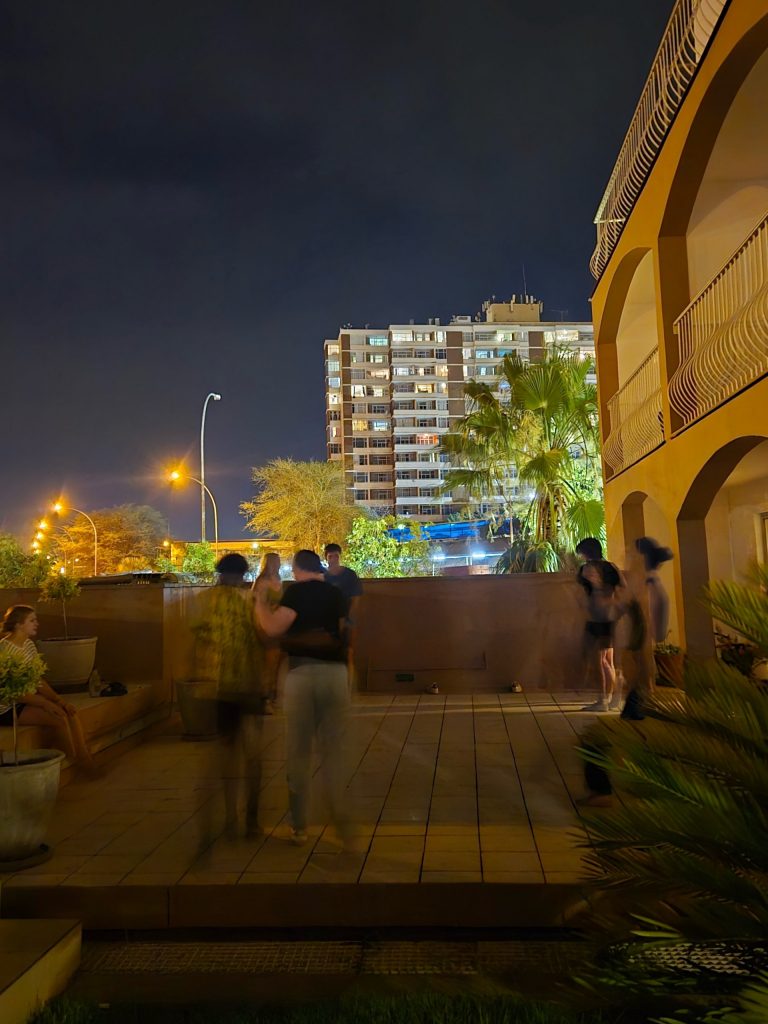
Sunday, November 3rd:
Free day! Today a group of us woke up and went to a Sunday market at “The Village”. “The Village” is a complex that hosts events such as music events and drag shows, with a number of great bites to eat including our group favorite Korean restaurant (I know – good Korean food in Namibia)! We took the time to browse the artisan crafts and farmers market style food stands. Today was the first day my appetite had truly bounced back from stomach sickness. I started my morning out with a “Green Machine” smoothie, which was truly reviving. I followed it up with some top tier lemon gelato for an astonishingly cheap price. Namibia has continued to positively surprise me with their desserts. I had a preconceived notion that Namibia would be so distinctly foreign that we would not be able to enjoy some of the familiar foods from home. This went without realizing that we live in such a globalized world where culture is accessible from all corners of the world. The influence of European colonialism, especially German, cannot go unrecognized and is prominent in many Namibian foods.
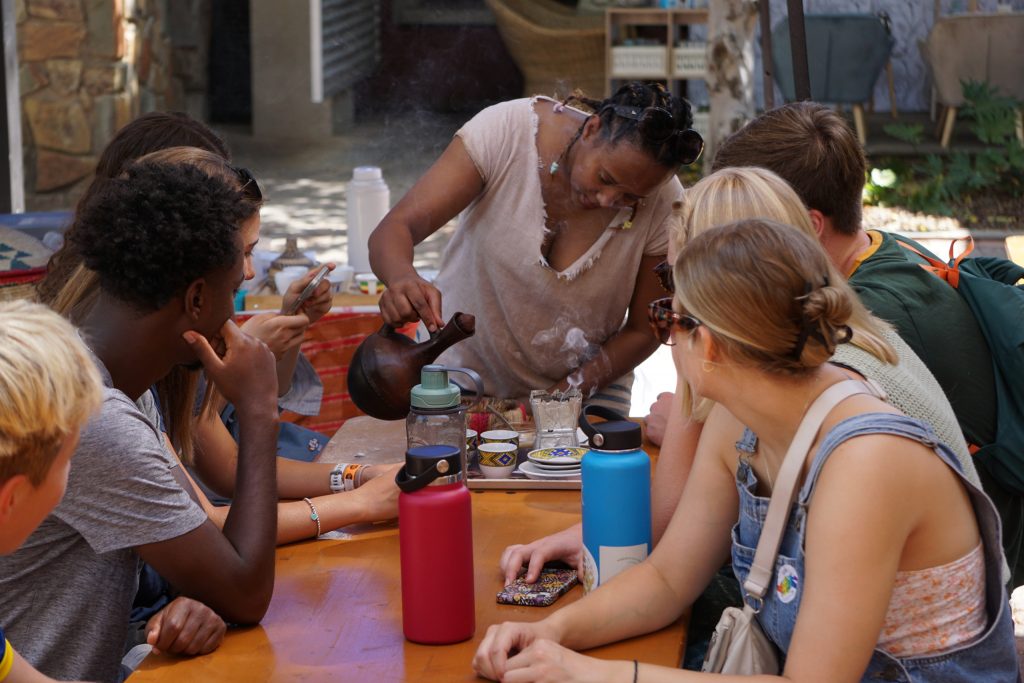
Monday, November 4th:
Our Monday started in typical fashion with another fantastic guest speaker. We met with Linda Bauman, a prominent LGBTQ rights activist in Namibia, and spoke about the struggle for equality, recognition and acceptance for LGBTQ people in Namibia. As Namibia is a very conservative and Christian society, much of Bauman’s approach to tackle homophobia in Namibia revolves around engaging in dialogues that humanize the LGBTQ community and unburden them of cultural religious stigma. One aspect that particularly stood out to me was the intersection between homophobia and hyper conservative Christianity in Namibia and the United States. US evangelical church and anti-abortion organizations have been funding anti-LGBTQ groups in Namibia, at a time in which there is a rise in anti-LGBTQ sentiment in both countries. Speakers like this inspire us with their resilience to cultural pressures, but also are sobering in reminding us that we are still in a constant struggle to create an accepting society that values all of us alike.
In the afternoon, we took a trip to the University of Namibia (UNAM) to hear from another guest speaker about decolonizing study abroad. While we may have our preconceived perspectives, it is extremely important to listen to and learn from each community we engage with. We are lucky enough to have the opportunity to engage with a vast number of communities throughout our time on Global Semester. Therefore, it is important for us to take knowledge and perspectives from interactions which expand beyond our preconceived American perspectives, and apply them to our future dialogues in a casual and professional setting.
After UNAM, my service learning group capped off our day full of engaging learning with an introduction to our organization: Physically Active Youth (PAY) in Katutura. This service learning opportunity fits into the goals of our faculty guided course, which examines the ethics of service and study abroad. We hope that this experience will help us observe the faults of short-term volunteering, but hopefully will also shed light on the importance of conducting service abroad in an ethical manner. We had a brief orientation and were extremely grateful for the opportunity to be a resource wherever necessary for the next two days.
Tuesday, November 5th:
Wow! It’s Election Day (kind of)! Due to the time zone difference, we won’t be seeing many of the results start to come in until November, 6th in Namibia. Lots of us are starting to feel the anticipation. We started today with our class on ethical tourism, where we discussed the positive and negative aspects of voluntourism in relation to power dynamics. We talked about social exchange theory, specifically whether or not reciprocal benefits between the host organization and the guest volunteer is truly possible due to contrasting power dynamics. While we would like to think that there are reciprocal benefits to our short term service learning experiences, in reality, we are contributing very minimally to the trajectory of the organization. We have the power to dip our toes in the water and grapple with concepts we have been talking about in class, while the organization relies on volunteers such as us for its functionality. It’s hard to justify our volunteering as real work, but instead more of a brief experience. Hopefully in this brief experience we are at least able to contribute where it is possible and analyze how volunteering for a non profit organization fits into the importance of service on a larger scale.
Our group departed to PAY in the afternoon (which I wish I had pictures of) for our first day of service work. Many of us were stationed with different age groups and helped teach subjects such as math, English, and even robotics! The kids were certainly surprised by the way we looked. I was quick to pick up names such as “hairy man” and “bigfoot”, probably because the kids had seen very few people with arm hair and beards before. It never fails to surprise me how raw and unfiltered kids are. One kid asked me if hairy people were always rich, which threw me for a loop. Maybe Namibians associate hairiness with whiteness, leading them to assume it pertains to the same privileges associated with whiteness such as higher socioeconomic status. I’m still confused about that comment, so I can only speculate.
I had the opportunity to work with grades 1-3 teaching math and English. Teaching English is no easy task, especially with children who speak indigenous languages as their first language or have learning disabilities. Using fingers to count is at least a universal signal, but I didn’t even know how to start teaching simple English grammar overcomplicating it with more English. I cannot begin to imagine the gaps in educational success in Namibia based on English language acquisition. After a few hours of teaching, we played a group game of soccer in the sweltering heat. It’s always beautiful to see how soccer brings smiles to all walks of life.
To conclude our day, we ate dinner at Sky Windhoek, where we had an absolutely stunning 360 degree view overlooking the city. The restaurant is located on top of the Namibian Independence Museum, which is somewhat of a tower-like structure. We all added to our growing gallery of Global Semester sunset pictures. I capped off the night with probably one of the best pieces of chocolate cake I’ve ever tasted and looked forward to another day full of energy and excitement.
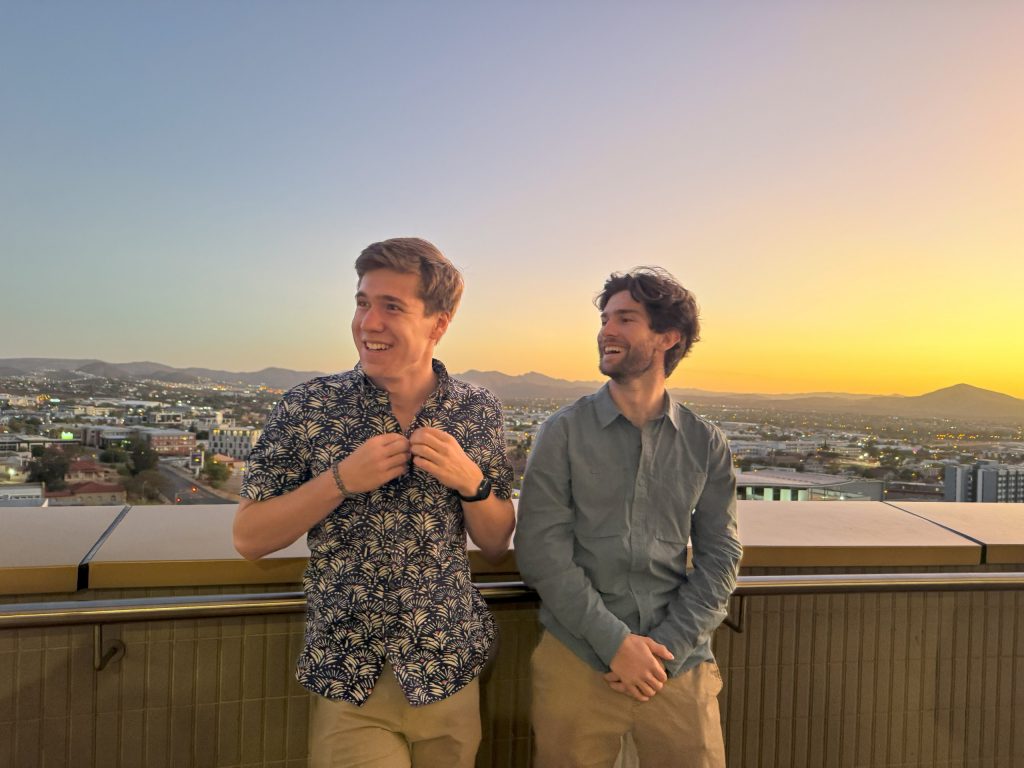
Wednesday, November 6th
I can’t begin to describe the sinking feeling in my stomach when I woke up this morning. This was not the outcome of the election that any of us wanted. It was quite a very rough start to the day. Unfortunately, I will have to leave it at that because I could passionately speak on this subject forever.
I am proud of each and every one of us for attending class today and facilitating discussions, despite how draining it felt. We discussed the feeling of guilt that us as privileged people grapple with while facing large structural inequalities in foreign countries. I feel that this is a topic that I have personally been trying to deal with, especially throughout my time in Namibia. As wonderful as Namibia is, it is the country with the second highest wealth disparity in the world, second only to South Africa. As an American, we are lucky to be able to reap the benefits of systems which are largely only accessible to the small minority of well off people: primarily white Germans and Afrikaaners. Guilt is one of many emotions that is sparked by looking around, viewing immense poverty, and being sheltered by the comfort of a well structured program such as Global Semester. A notable point brought up during discussions was that guilt is a feeling attached to a flawed action that you have personally committed. If there is no wrong action that you have directly committed, it is important to be aware of structural inequalities, but not let the guilt drown you from your experiences, new perspectives, and awareness that you may be able to spread in future conversations.
Following class discussion, my group headed over to PAY. I was not sure that I would be up for 5 hours of working with kids coming off such a recent emotional low, but the kids just lit up our world and offered a very necessary positive outlet. It was a day full of dancing, teaching, and fun activities such as karaoke and watching cartoons.
What followed was my favorite unexpected adventure so far in Namibia, sheerly due to its pure authenticity. We took PAY e-bikes to Oshetu Market, known for its kapana (Namibia grilled meat). In reality, I had no idea what I had got myself into. When we first arrived at the market, we drew a lot of attention. We were very clearly foreigners on expensive bikes. I questioned where we would put all of the bikes, but after wheeling them past a couple of cow heads swarmed by flies, we left them with two of the PAY workers in the middle of the market. Our food journey began. Oshetu was essentially an open air meat market with some spices and woven goods being sold on the side. Meat was butchered and directly thrown on a makeshift grills composed of gas burners and sheet metal. We walked down a line of grills, with vendors attempting to lure us towards their grill with every step. After eventually stopping at one of the vendors, we sampled the meat directly off of the grill, dipped it in some spice, and I was not disappointed! It was tasty, flavorful, and rich. We sat down in a booth and enjoyed a final group meal with the staff composed of kapana, the special spice, “fat cake” (a type of fried dough), and salsa (couldn’t tell you what this was made of). The bike ride back was quite surreal. We weaved in and out of traffic and had a first hand view of the bustling Katutura lifestyle. I’m still left speechless by the spontaneousness and authenticity of this experience.
From the eye opening and impactful speakers, to craft markets, to helping teach children, and stumbling upon open air meat markets, the Namibian people have proven to be extremely resilient and friendly. They are committed to working towards creating a more civically engaged and equal country. I look forward to fully relishing every moment throughout our final week here, because Namibia is a truly beautiful country in every way shape and form.
With gratitude,
Sam
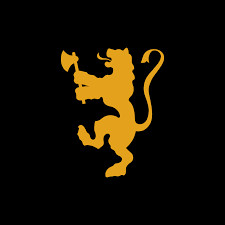
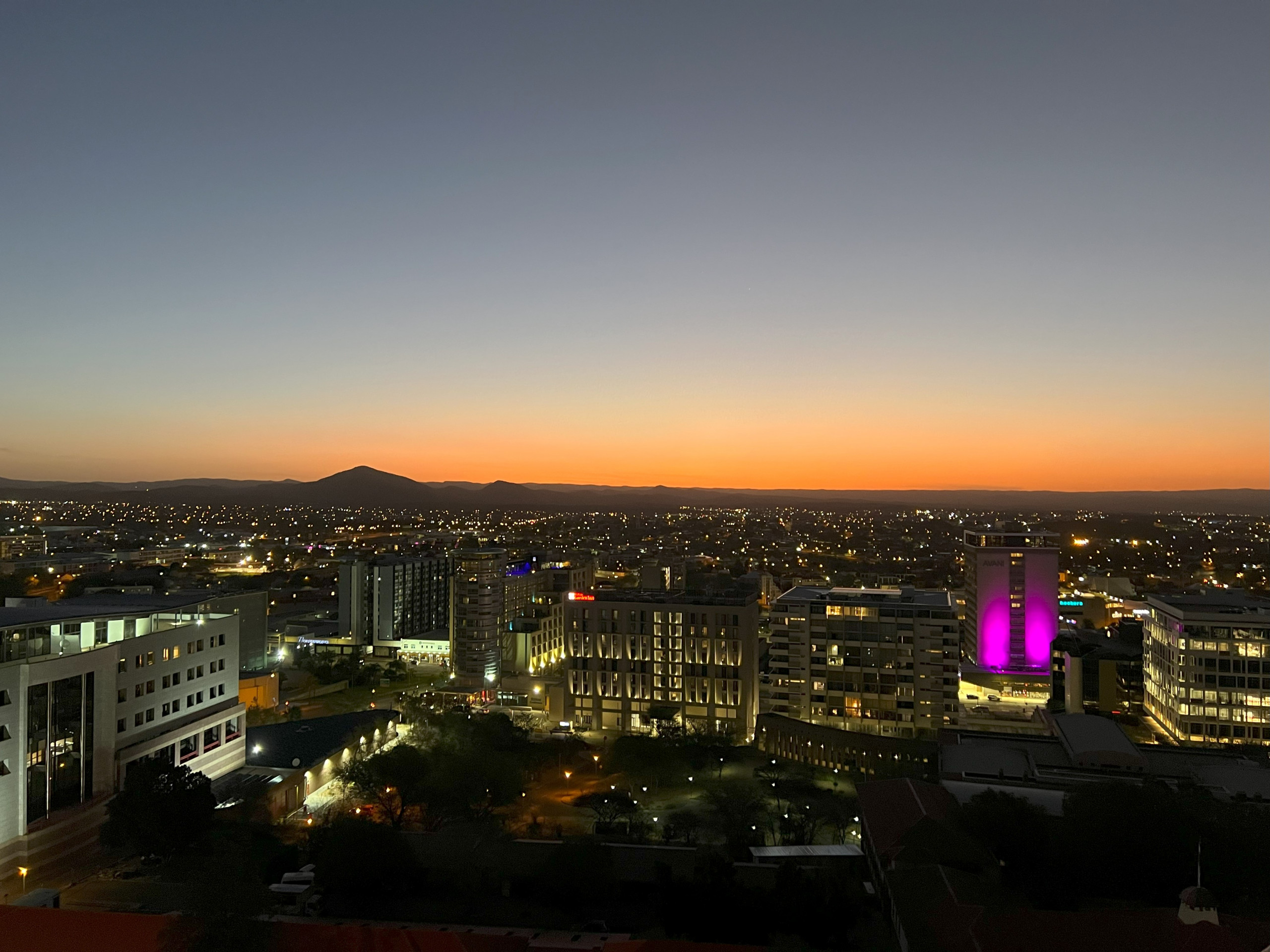
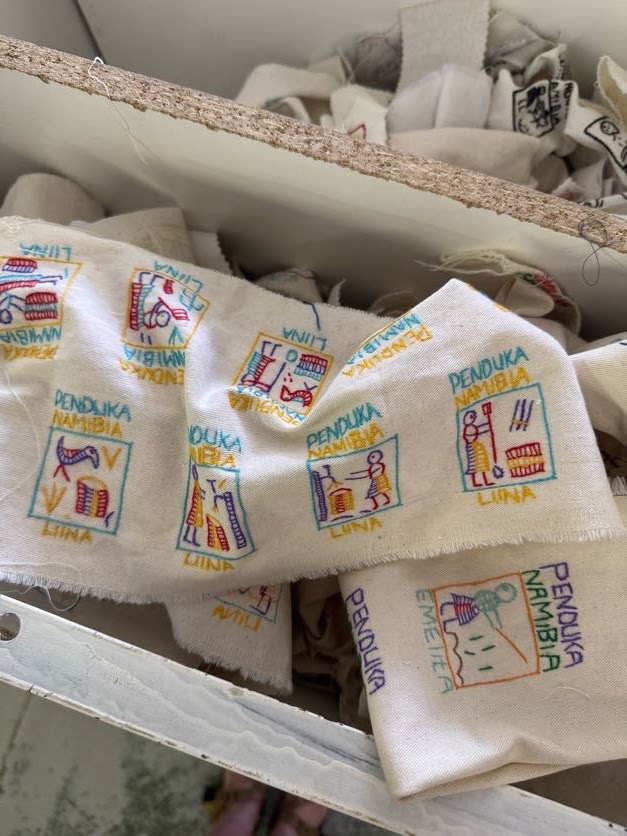
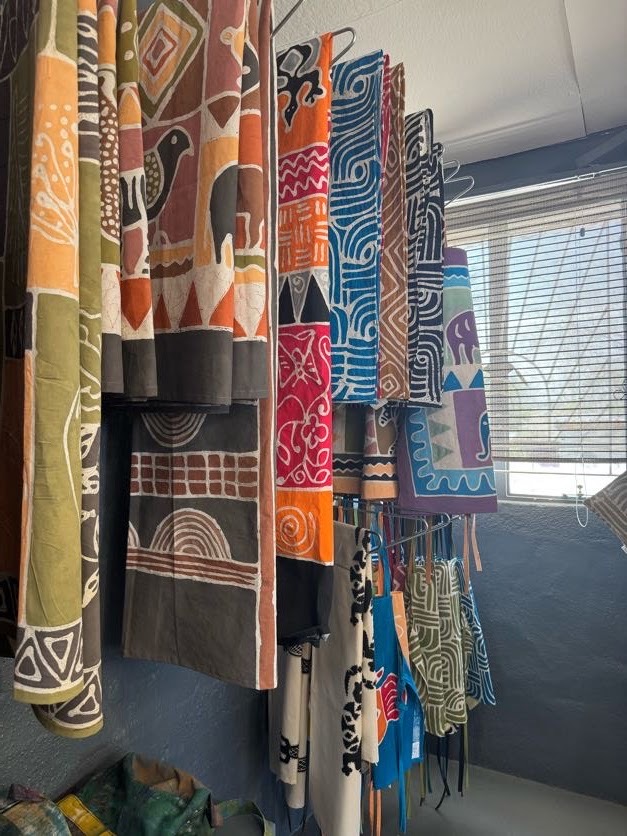
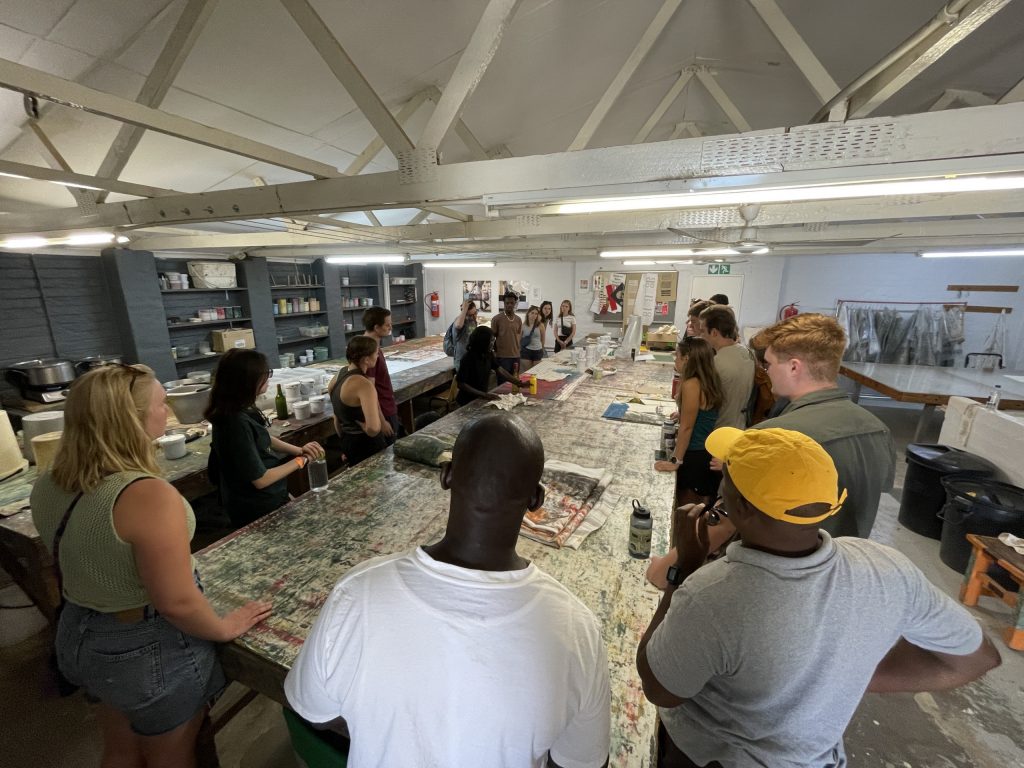
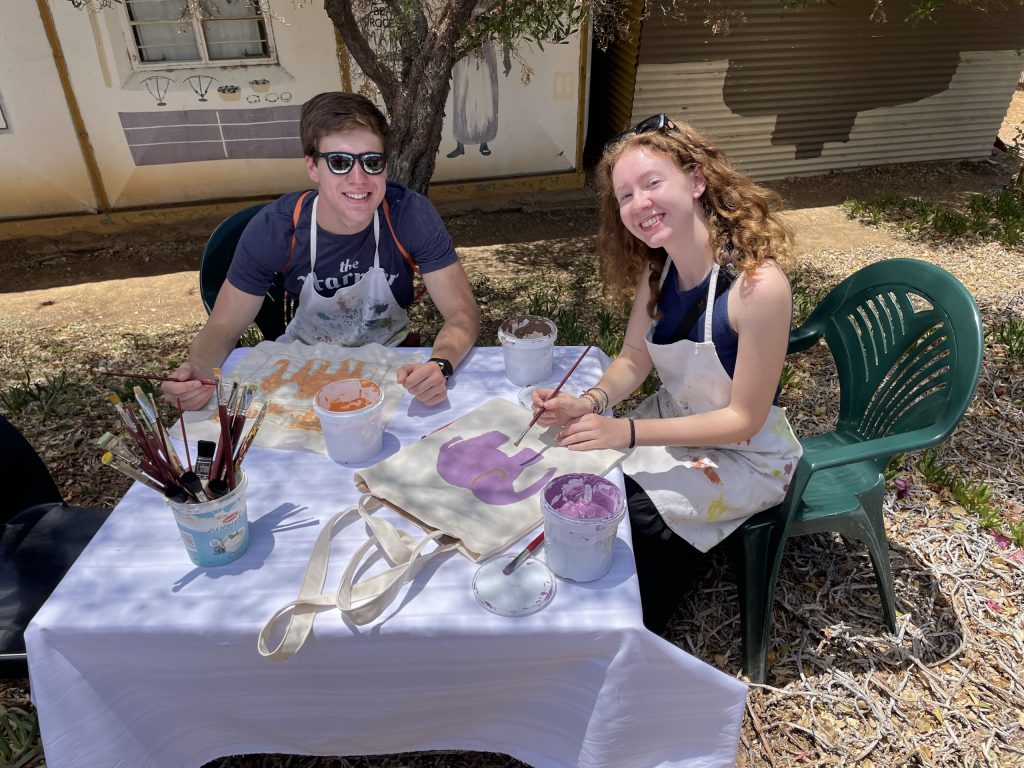
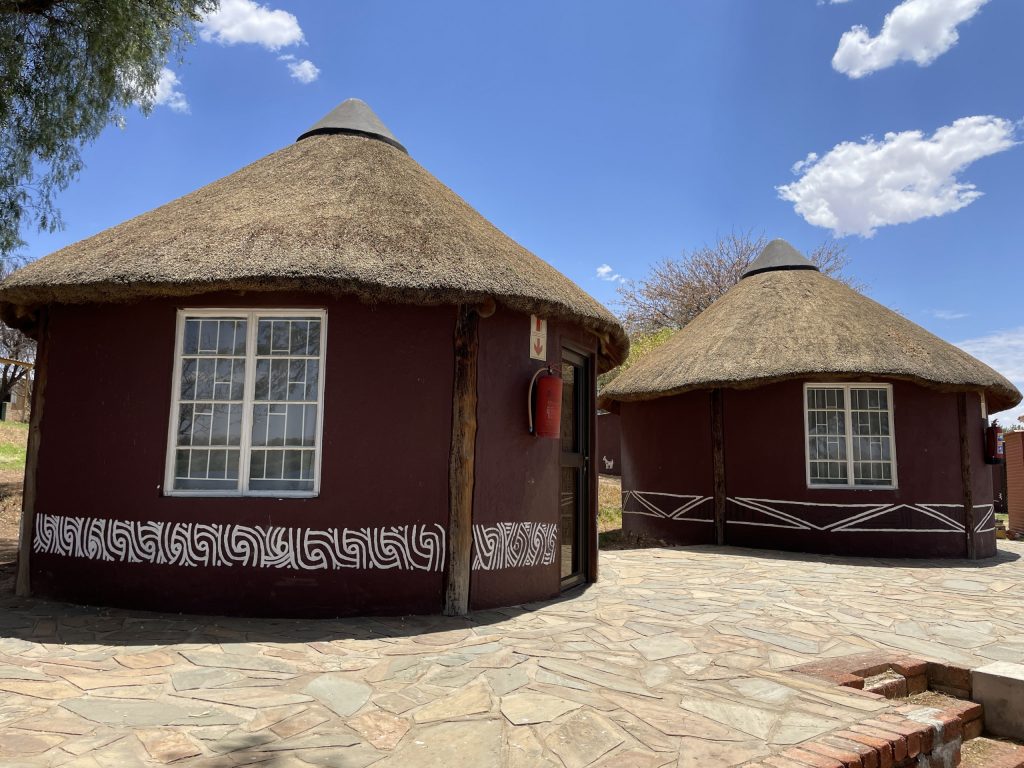
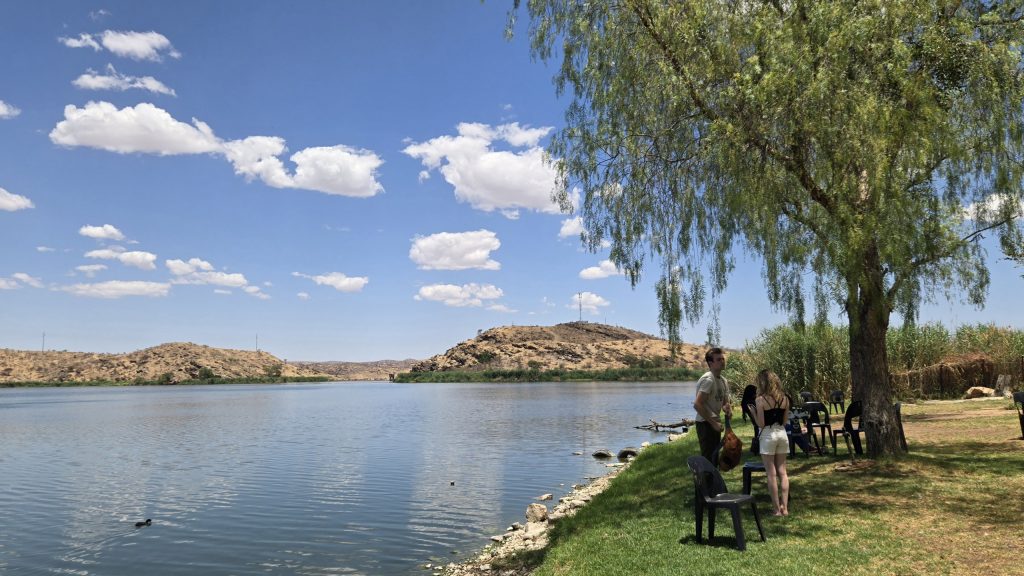
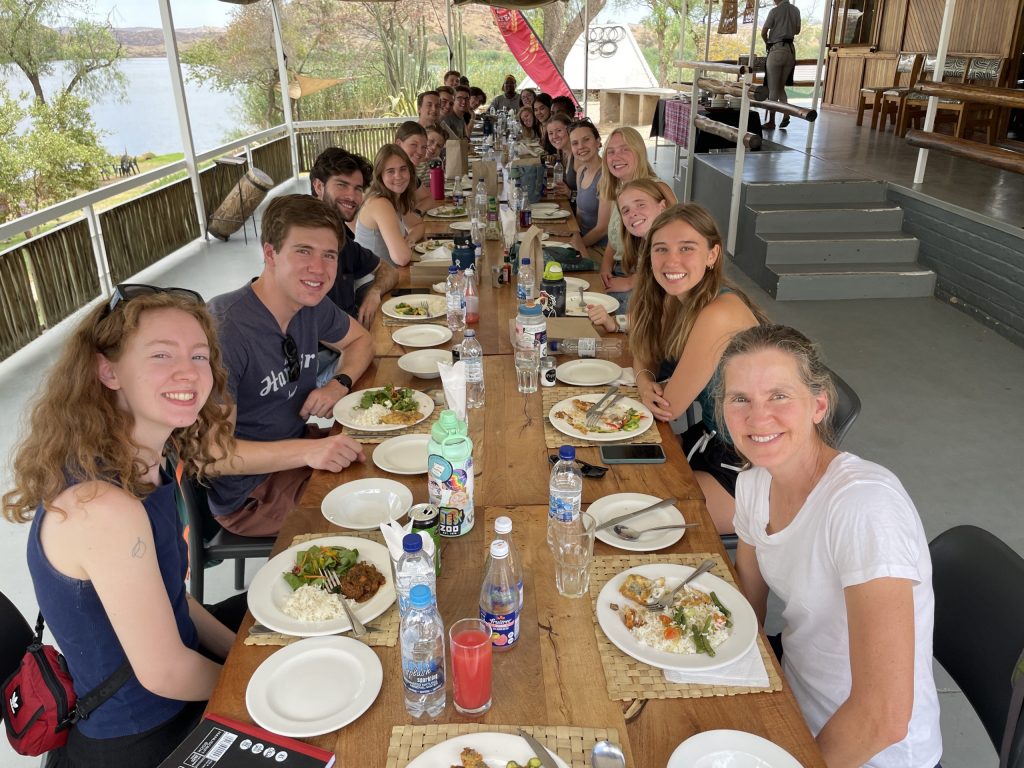
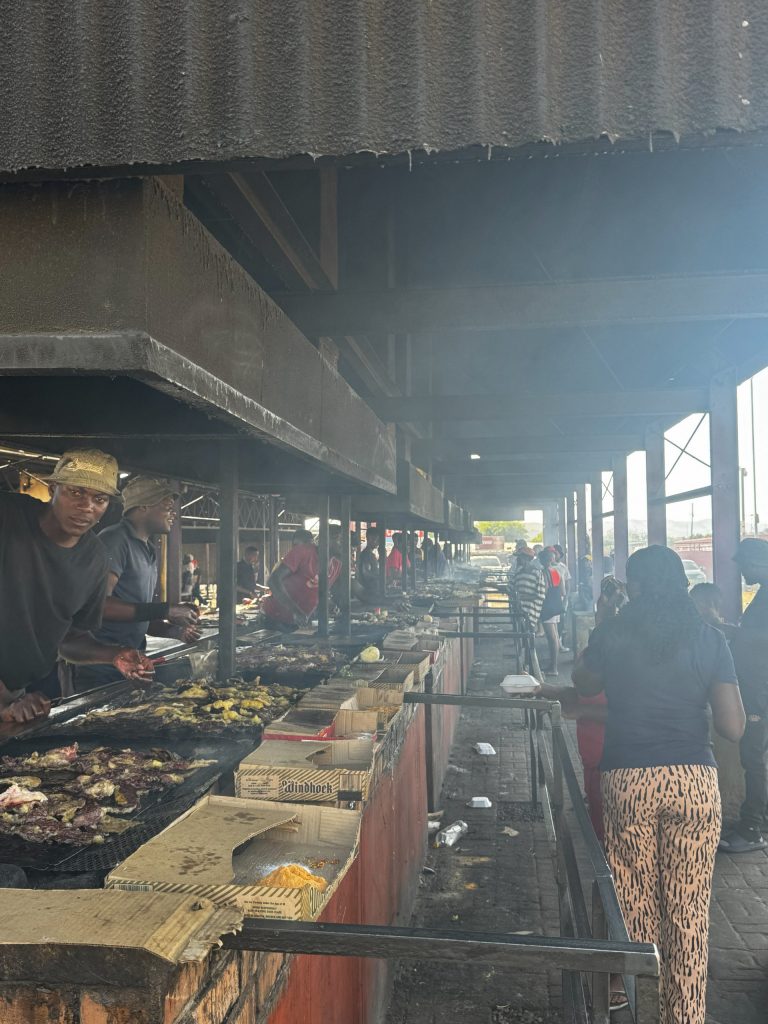
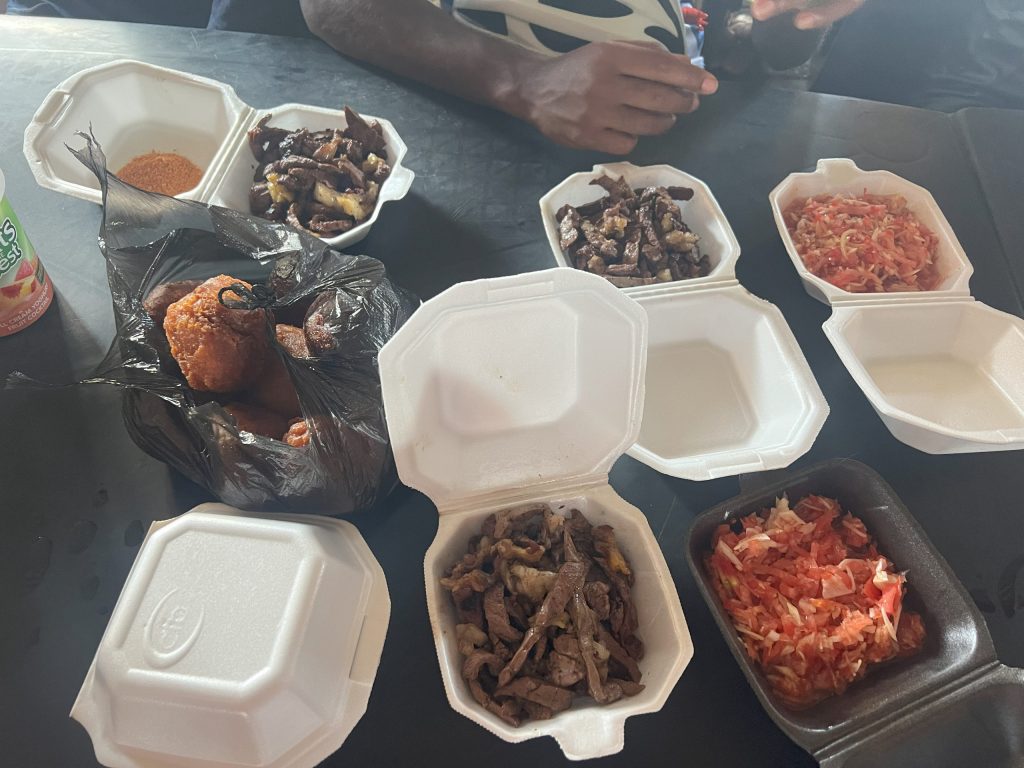
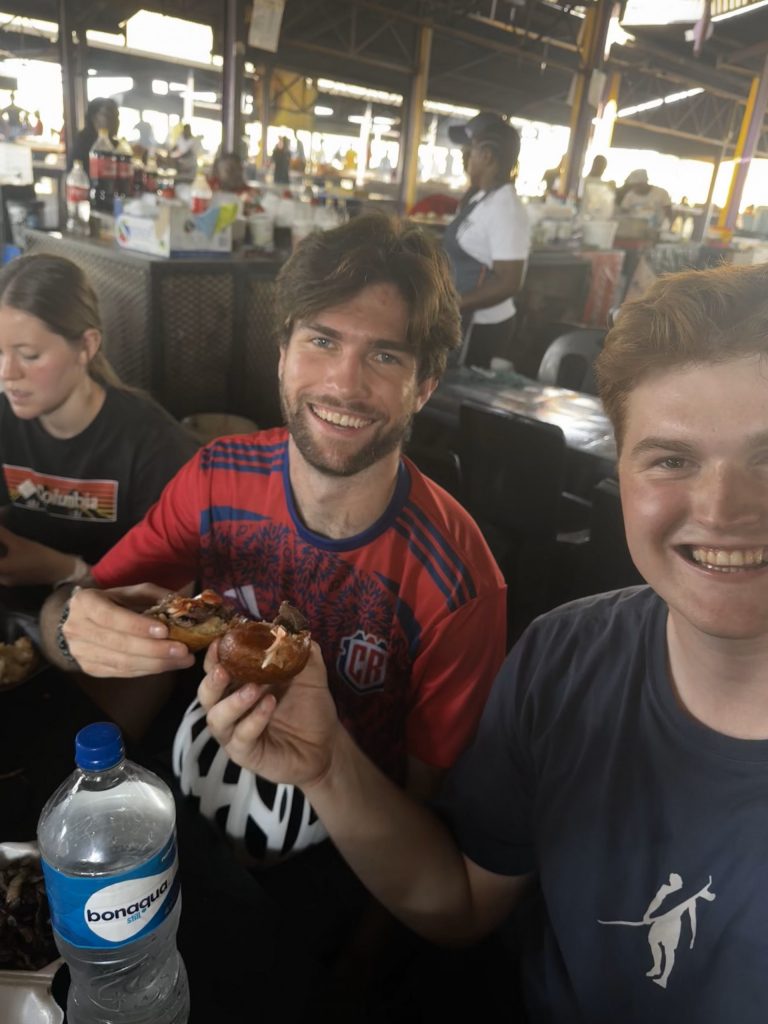
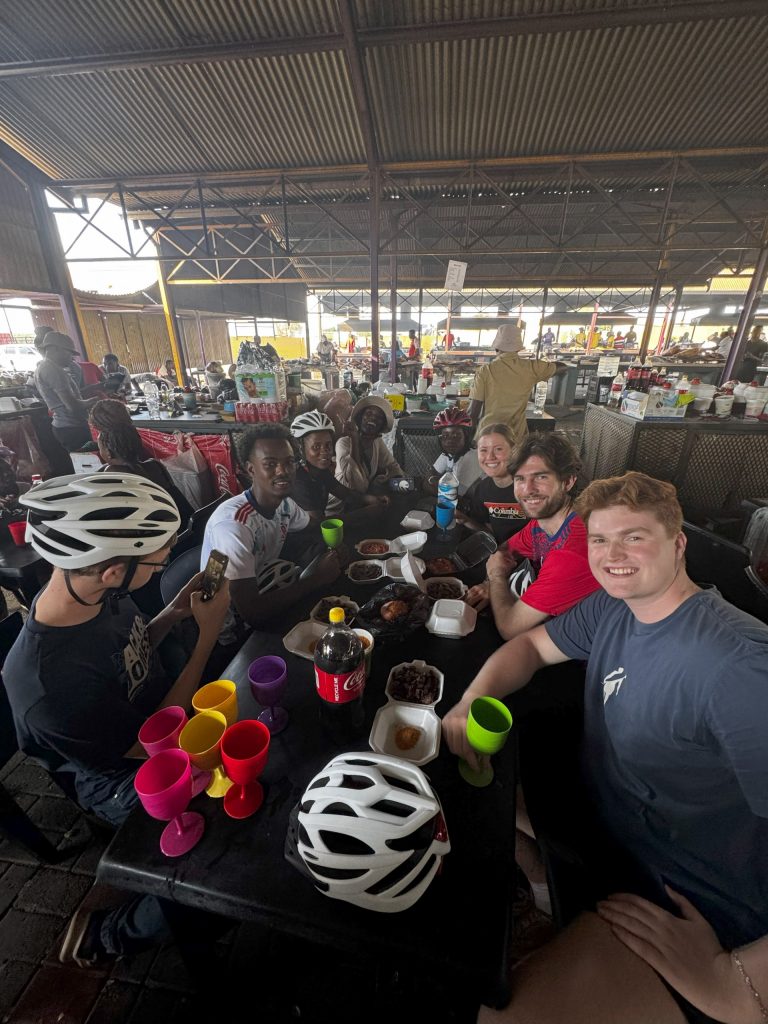
Leave a Reply